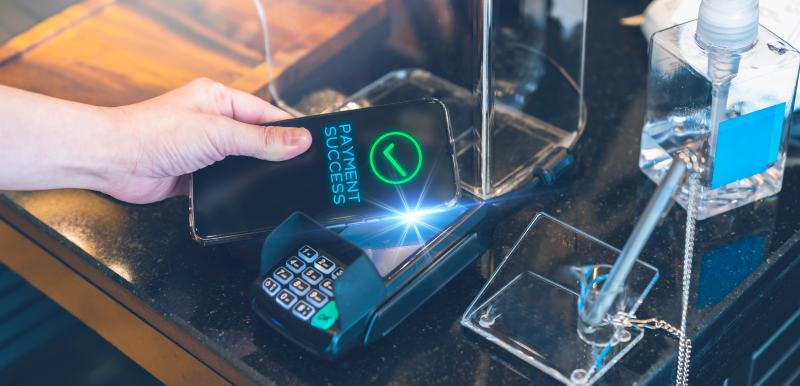Welcome to the Post-Cash Retail World
In the retail world, even the best ideas can have a short shelf life, so it's pretty amazing to think about the long run cash had as our primary tool to purchase goods and services. Archaeologists have found currency dating back thousands of years, but only in the last five decades have coins and bills had to share top billing.
Credit cards gained traction in the 1960s and 1970s, and it wasn't common until the 1990s for people to use their bank cards to make purchases in retail stores. Despite these innovations, it took COVID-19 to hit in 2020 to take touchless payments out of the fringes and into the mainstream. Suddenly, companies innovating in that sector found themselves poised for major success.
It's hard to overstate the massive impact the pandemic had on brick-and-mortar retail. Just about every store was forced to shut their doors or significantly limit the number of customers inside. Hundreds of thousands of businesses didn't survive, and those that did needed to radically reimagine everything from how people waited in line to how they ordered items from home.
[Read more: Huntington Beach Amazon Fresh to Offer ‘Just Walk Out’ Shopping]
And one of the most significant changes was the dominance of touchless payment systems: according to the State of Retail Payments report from the National Retail Federation, over two thirds of merchants were using touchless payment technologies by 2021. In the first half of the year, “no-touch payments have increased for 69 percent of retailers surveyed.” Adoption rates of this magnitude and at these speeds are almost unprecedented.
SMB Adoption
Onboarding costs have made small and medium sized businesses (SMBs) reluctant to adopt touchless payment. It was easy for big retailers to make the switch, but credit card chip readers were about as cutting-edge as most small chains or mom-and-pops got, and some were still cash-only, without even a reliable means of online ordering. SMBs, especially restaurants, had to scramble for digital integrations with delivery services when COVID hit.
The pandemic forced SMB owners to accept the cost of adopting touchless and digital payments, a move that will only benefit them long-term. Thankfully, startups have seen opportunity in this underserved sector. Shopify has introduced “buy now, pay later” with its Shop Pay installments, making larger retail purchases more affordable. Xero and the startup Wise (once called TransferWise) have teamed up to offer stores account management and transaction processing.
The New Leaders
The touchless payment revolution was actually led by companies almost unknown before the pandemic. Although major financial institutions were able to support the change, the foundational work was done by upstarts who suddenly found themselves with a willing audience and massive opportunities to enter the big time. With consumers today juggling multiple customer loyalty apps, Drop centralizes phone-based payments for these apps in their service and incentivizes users with rewards from brands like Starbucks, Grubhub, and Uber.
Why were these companies able to succeed and thrive even as other payments companies struggled with the fallout from empty stores? The answer goes far beyond opportunity, and into the heart of what defines success. After all, there were plenty of other companies in the payments industry who didn't evolve over the last two years and so were unable to catch the new wave.
The companies that established themselves as market leaders were able to do so because they saw unique opportunities in an emerging market. Startups that adopt a similar strategy are poised to repeat this success and lead the industry moving forward. SparcPay, for example, saw beyond the retailer-customer relationship, and are gearing up to help retailers pay their suppliers with automated payments, improved encryption, and stricter security.
There is no single magic bullet that causes startups to become successful. The post-cash landscape will be a new world where adaptation is the key to surviving and thriving. The companies that see the most success will be those who not only innovate for themselves, but who recognize rising startups with whom to partner to bring their new ideas into a company’s portfolio of solutions for fitting into a cashless economy.
— Marcus Daniels is a founding partner and CEO of Highline Beta, a hybrid corporate venture studio and VC firm that works with global enterprises including RBC, Intuit, and AB InBev, and invests in startups that pilot with corporations to drive growth innovation. He has 25-plus years as a serial tech entrepreneur and a top decile venture capital investing track record in 50-plus startups.





